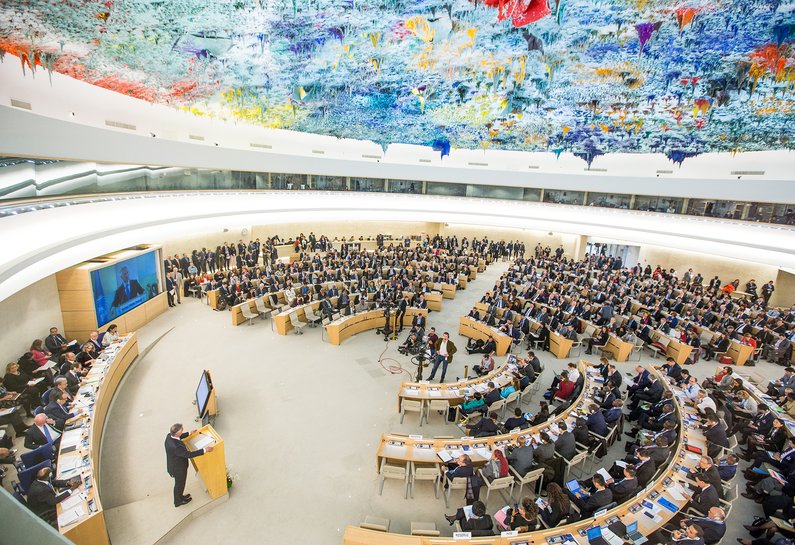UK fails to support resolutions upholding Palestinian rights at Human Rights Council

- A/HRC/49/L.26: Human rights situation in the Occupied Palestinian Territory, including East Jerusalem, and the obligation to ensure accountability and justice (FOR: 31 – AGAINST: 14 – ABSTAIN: 2)
- A/HRC/49/L.17: Right of the Palestinian people to self-determination (FOR: 41 – AGAINST: 3 – ABSTAIN: 3)
- A/HRC/49/L.18: Israeli settlements in the Occupied Palestinian Territory, including East Jerusalem, and in the occupied Syrian Golan (FOR: 38 – AGAINST: 4 – ABSTAIN: 5)
The first of these included important references to Palestinians’ rights to health, calling on Israel to “comply immediately with its international law obligations to the protected occupied population, and ensure non-discriminatory access to vaccines for immunization against the coronavirus disease (COVID-19) in the Occupied Palestinian Territory, including East Jerusalem, including in coordination with the Government of the State of Palestine”; stressing “the need to end the Israeli policy of closures and the imposition of severe restrictions and checkpoints … which are applied in a discriminatory manner affecting the Palestinian population only and all of which obstruct the freedom of movement of persons and goods, including medical and humanitarian goods”; and reiterating:
“the responsibility of Israel, the occupying Power, to respect the right to health of all persons within the Occupied Palestinian Territory and to facilitate the immediate, sustained and unfettered passage of humanitarian relief, including the access of medical personnel, the entry of humanitarian equipment, transport and supplies to all areas under occupation, including the Gaza Strip, and the granting of exit permits for patients in need of medical treatment outside the Gaza Strip, and stresses the need for the unhindered passage of ambulances at checkpoints, especially in times of conflict”
The resolution further stressed “the imperative of credible, timely and comprehensive accountability for all violations of international law”, which in the oPt have included repeated attacks on Palestinian healthcare facilities and personnel, including during Israel’s 2021 military offensive on Gaza.
While these resolutions all passed with strong majorities in the Council, with support from European states including France, Germany, Poland, Finland and the Netherlands, the UK failed to support any of the resolutions. Instead, the UK abstained on the resolution on human rights and accountability, and voted against the resolutions on Israeli settlements and on the right of Palestinians to self-determination.
Representing the UK, Ambassador Simon Manley delivered a statement reiterating the UK’s opposition to UNHRC Agenda Item 7 under which the human rights situation in the oPt is discussed each year, and under which the settlements and self-determination resolutions were tabled. No specific explanation was given for not supporting the resolution on human rights and accountability, however, which was tabled under Agenda Item 2.
As highlighted by Dr Mohammad Iskafi, the Director of Emergency Response at the Palestinian Medical Relief Society who spoke to the Council with MAP’s support last month, Israel’s discriminatory policies and practices, attacks on Palestinian healthcare, and deprivation of Palestinians’ rights to health and dignity are emboldened by impunity. Opposing scrutiny of such policies and practices in international forums like the Human Rights Council only makes their continuation and recurrence more likely.
The UK’s Asia and Middle East Minister Amanda Milling recently stated in Parliament that “all nations should be held accountable for the international obligations and commitments that they freely signed up to.” The UK’s position at the Council last month has therefore again exposed its dangerous double standards on issues of accountability and international law when it comes to the need to ensure protection of Palestinian health and healthcare.
Aside from these resolutions, this session brought new developments: Professor Michael Lynk, delivered his final report as UN Special Rapporteur for human rights in the occupied Palestinian territory, concluding that Israel is imposing a system of apartheid on Palestinians in the oPt. The Human Rights Council also appointed Francesca Albanese as Professor Lynk’s successor in the role of Special Rapporteur. Albanese is an international lawyer with expertise in international human rights and humanitarian law, and on Palestinian refugees. MAP looks forward to engaging with Ms. Albanese as she takes her mandate forward.
Stand up for Palestinians’ equal rights to health and dignity by signing the pledge today.
Photo: A wide view of the Human Rights and Alliance of Civilisations Room at the Palais des Nations during the Human Right Council. (Credit: UN Photo/Elma Okic).

